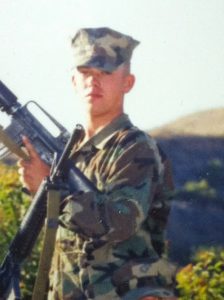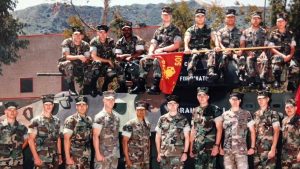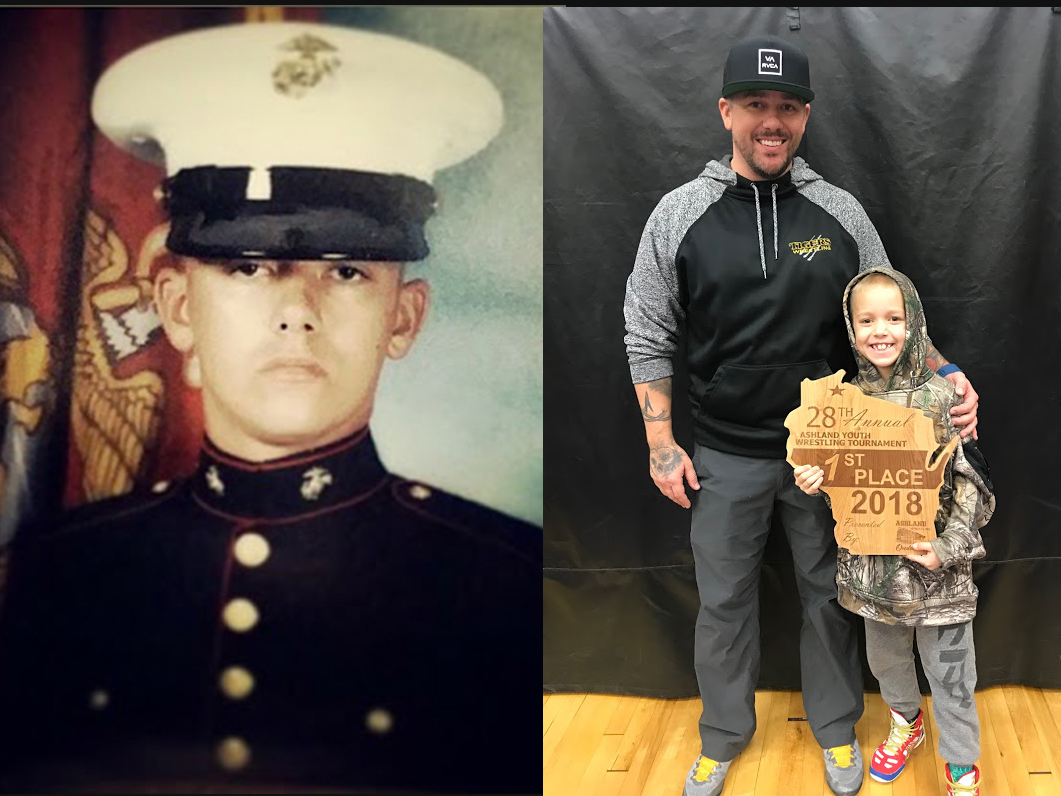This week OnionBusiness launches a new series of personality profiles, looking at onion industry members who’ve served in the United States Armed Forces.
We needed to look no further than our own backyard – Broker’s Perspective contributor Jason Vee, president of Vee’s Marketing in Superior, WI, is a veteran of the U.S. Marine Corps and agreed to tell his story. It’s a wonderful account, full of what we’ve named “Jason-isms” or “Vee Bombs,” and we’re proud to share it with you now.
Providing us with a snapshot of his childhood and formative years, Jason said, “I grew up in Lake Nebagamon, WI. That’s the far, northwest corner. If Lake Superior is a face, we are right underneath the nose. I grew up with two younger siblings; my brother, Jamie, and my sister, Angie.”
Produce has been a part of his life since he was a youngster, he said. “My dad, Scott Vee, started Vee’s Marketing in our basement at home in 1990 after leaving Food Services of American in Duluth, MN. I was 12 at that time.” Admitting that he “wasn’t great at school,” Jason said he managed “to pass tests without doing much, or any, homework. That got me to graduation, but not in any impressive manner.” He also didn’t do a lot of school-related activities, noting, “I tried a few sports in junior high – football, wrestling, and track. But then I traded sports for work, and I worked after school throughout high school. That seems dumb to me now as an adult, but I felt more productive earning money than playing sports in my teen years.”
After deciding that college wasn’t a good fit, at least at that time, Jason says with typical candor, “I enlisted in the military out of desperation. In 2002, I had already quit or failed college twice. My last job before enlisting was working third shift at a taco shell manufacturing plant. I was making about $300 a week stacking hard taco shells being carried via a conveyor belt out of hot oil.”
He continued, “The shells were just cooled enough on the line that they wouldn’t do damage to your skin, but it still hurt and turned your hands red. That plant is gone. I assume they have robots to do that job now.” And, Jason said, “That was a low point. I was approaching my 20th birthday, and I remember thinking that I hadn’t accomplished anything in my life that I was proud of. The upward mobility at the taco plant wasn’t promising either.”
Still, “I had enough wits about me to know that if I didn’t completely change my network and surroundings, then my situation was never going to change. Military checked all the boxes for me. New network. New location. New job skills.”
So he interviewed with recruiters from the Army, Navy and Air Force, and Jason said, “It felt like buying a car or a timeshare. Recruiters are salespeople. They are fit and well groomed. They would lead in with low hanging fruit like, ‘What kind of climate do you like? Have you ever been to Texas?’ It all felt weird and phony until I walked into the Marine Corps recruiting station in Duluth.”
Epiphany time. “That day is still remarkably clear to me,” Jason said. “I was wearing beat up, blue track pants with holes in them and a maroon, Alien Skate Shop t-shirt with the sleeves cut off. Another well groomed, fit recruiter got up and greeted me when I walked in. He offered me a seat. We each sat down and then there was silence. That was the first sign that this was different than my last meetings. I said, ‘Well, go ahead,’ ready for another timeshare pitch to Hawaii or something.”
And, “He laughed abruptly and then did a 10-minute rant berating me for thinking 1.) that the Marine Corps was so desperate for recruits that they would be lucky to have this 20-year-old burnout in track pants with holes in them; and 2.) that I thought I would walk into this fella’s office unannounced and he would start doing a monkey dance on my command. And then he sent me on my way.
“He got me. That was the first time that anyone spoke to me in a way that hammered my false sense of pride so far into the ground that I really started to evaluate my self-worth, probably more accurately than ever before. I wanted to be on that guy’s team. So, I slept on it. I ate the sh*t sandwich. And I went back the next day to try it again. We figured out the prerequisites, including how long I had to stop smoking weed to pass a p*ss test, and I signed right away.”

Photo courtesy of Jason Vee
Thus began Jason’s four-year service in the Corps, from June 22, 1998, to June 22, 2002. He reached the rank of an E-5, Sergeant.
“I got promoted quickly,” he said. “Until my time in the Marine Corps, I hadn’t really given myself any credit for having athletic ability. But after putting in a considerable amount of work, I was scoring the highest score possible on the PFT (physical fitness test). High PFT scores and good reviews got me to E-5 right around my three-year mark.”
His first duty station was Camp Schwab in Okinawa, Japan, where he was stationed for a year, and the remainder of his time was on Camp Pendleton in Oceanside, CA.
Thanks to social media, Jason is able to stay in touch with “some of the gang,” and he said, “Some of my first duty station people get together occasionally.”

Photo courtesy of Jason Vee
In addition to lifelong relationships, Jason also took away a varied skill set when he left active duty.
“I was a Light Armored Vehicle mechanic in the Corps. I really enjoyed being a mechanic, so I started taking mechanic courses at a community college that I can’t remember the name of.”
While he can’t remember the name of the school, he does remember the outcome of his attendance: “Those are the first college courses I stuck with and got As. So, when I got out of the Marine Corps, I pursued college. Because I had neglected school my entire life, I had to take Math 50 and English 50 at 24 years old.” With age comes wisdom, and he said, “I figured out that school isn’t that hard if you do the work. I racked up some credits at the community college and was later accepted to University Wisconsin Madison where I got a degree in economics.”
Then the produce mechanism started turning, and Jason found, “As a newly graduated economist, I saw that working for Vee’s Marketing had the most potential for high earnings.” So he started in 2006, but he didn’t start at the top.
“I was eager to learn so I grabbed every responsibility I could get my hands on. I started with the accounting,” he said. “We were handwriting everything. Invoices, passings, payables were all written in triplicate on carbon copies. Even envelopes were handwritten. One of my first projects was implementing Famous Software.”
And? “I’m the president now, and I still handle all the onion sales. Since I started, we have branched into potatoes, produce freight, and now most recently southwest fruits and veg. I enjoy team building and learning new commodities.”
One logical question we had was: How does your military training come into the way you conduct business?
He said, “Marine Corps and the produce industry share similarities. Marine Corps is big on accountability. I think that translates well into our industry. ‘You can delegate duty, not responsibility’ stays with me, especially in freight work. That’s why we choose our carriers carefully and avoid the load boards at all cost. Trucks off the board have an exponentially higher rate of disappointment than my regular carriers. The accountability of that disappointment falls on me, no matter who the carrier is. Once that foundation of accountability and self-awareness is established, it is easier to accept criticism and take corrective action.”
And he came away from his service with other newly honed traits as well. “The Marine Corps is great at instilling leadership skills. Some people have that leadership trait built in from birth, but most of us do not, including me. The Marine Corps has lots of little tricks to turn the shyest recruits into leaders.”
Jason said, “It starts with small things like leading exercises in groups of four or five people. That doesn’t sound like much, but for young men that have maybe never been in team sports or group anything, this might be their first time even speaking in front of a group. That can be a powerful thing. And that progresses quickly. So that even at 22 or 23 years old, a Marine can command as many as 80 people under him, depending on the duty or billet. I did three months on guard duty at Pendleton where I had 70-80 shiny, new Marines straight from recruit training under my command.”
And today the leadership skill is utilized with other young “recruits.”

Photo courtesy of Jason Vee
He said, “I currently coach youth wrestling. I have 50-60 kids in groups from 4k (four-year-old kindergarten) to 8th grade.
“And this is something I do with my youth wrestlers regarding leadership training: I circle them up. Each of them takes a turn in the middle of the circle. They tell everyone who they are, what exercise we will be performing and how many reps. If it’s not loud enough for everyone to hear, I make them do it again. The shy ones hate it at first. And then after two or three times, it’s no big deal. Then as they get older, they move onto scoring matches, leading warm-ups, and teaching techniques. They think they are just learning how to wrestle, but we are giving them life skills in leadership, public speaking, and confidence that they will have forever.”
We asked if he handles problems differently than he would have without military training, and Jason said, “I like this question. This is something that Scott and I have been at odds with since I started. I’m calm. Like really calm. Scott is more panicky and intense.”
So, Jason said, “Scott’s temperament is much better suited for sales than mine. And I am better suited for things like emergency problem solving, or 911 dispatch.”
That calmness “drives Scott crazy because he wants me to match his mood. It will never happen,” Jason said. “The Marine Corps beat the anxiety out of me more than 20 years ago.
“If I had to explain how, I think it was probably the one-on-one, frequent, yelling reprimands. See, before that, a one-on-one confrontation like that was mostly fight or flight. And I like to fight. Marine Corps doesn’t give fighting as an option when getting lambasted by superiors.”
So, he said, “I had to find a place in my brain to suppress anxiety and replace it with corrective action. That’s difficult. And it’s a strange and invaluable skill I got from the military. It’s the ability to stay calm in high-stress situations. That skill translates very well into produce. I like to tell people that you won’t hurt my feelings, that I’m a trained expert at getting my ass chewed. And that’s the truth.”
We also asked about military discipline, to which he answered, “Military discipline is just an expression. What is military discipline? It’s just routines and processes. For example, I think we all brush our teeth with military discipline. Or we should. It’s a routine and a process.”
Because he knows that, Jason said he can “implement lots of routines and processes here at Vee’s Marketing. We get the mail and do receivables daily. Payables go out weekly every Wednesday. Profit reports get reviewed Tuesday mornings. It’s not compelling, but it’s organized. And once the process is implemented, we do it without really thinking about it, sort of like brushing our teeth. That’s my interpretation of military discipline.”
Jason Vee took a world of training and structure and situational analysis from his military service, but he also took something else for which we give him great kudos. That’s attitude.
“Military service changed my life,” he said. “The Marine Corps gave me all the tools I need to be a successful business person, an attentive husband and a productive parent. I try to keep that in perspective when I see people burning flags or taking a knee during the anthem in protest.”
He concluded, “It’s not for me. I don’t do it. But if I look at it objectively, the flag and that anthem mean something different for me than those people. So, sit, stand, spit, I don’t care. You do you. Just don’t bother me when I’m standing silently during the anthem.”
Thank you, sir, for your service. God bless you.



